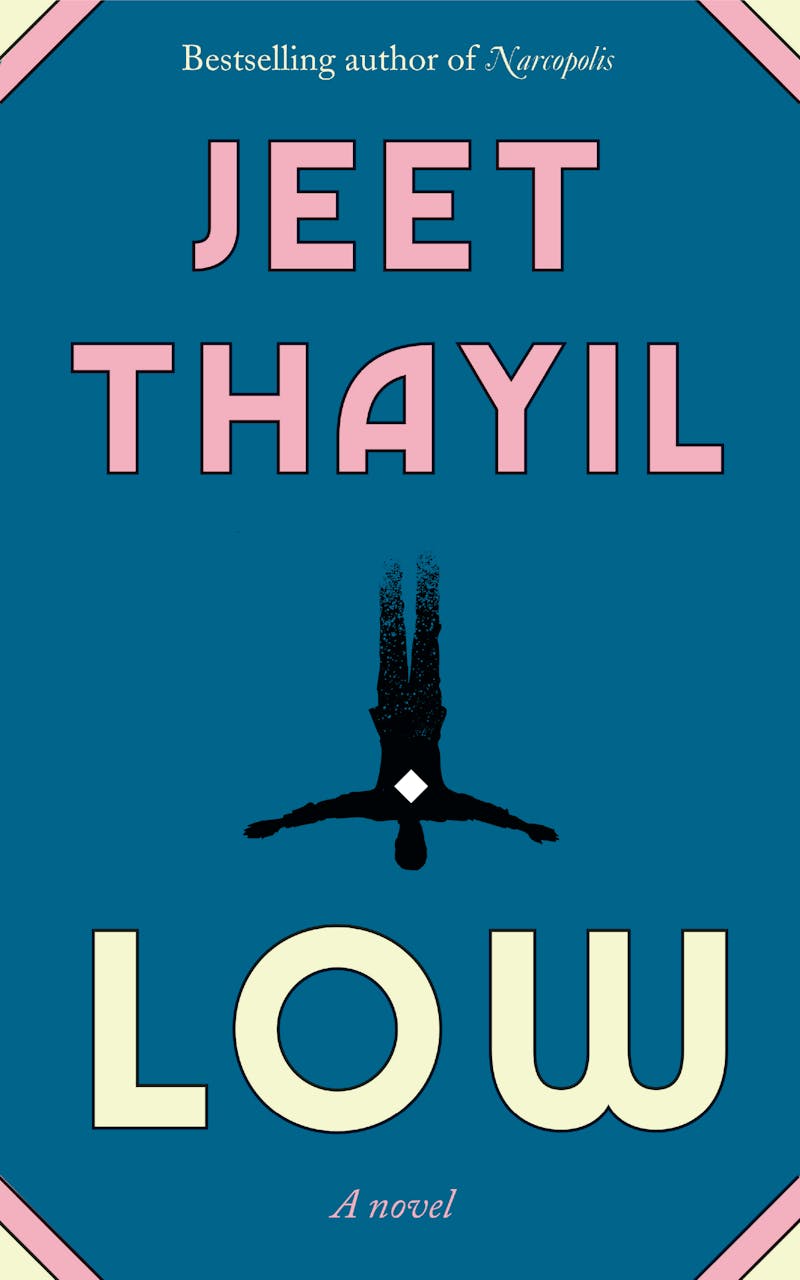On the fourth page of his new novel, Low, the author Jeet Thayil steps outside the proceedings to offer this parenthetical, qualifying the ringing of some bells: “(The bells are an omen, and they ring more than once in this story.)” It’s always helpful for the reader when the author tells it straight, though when it comes to its themes, Thayil’s bombastic little book isn’t exactly shy. Anyway, I didn’t notice any other ringing bells.
Low is a descendant of The Lost Weekend, Charles Jackson’s exuberant and horrifying novel of alcoholism. It’s the story of one man’s drug-addled sojourn in Mumbai, following the suicide of his wife. The titular lowness is not simply the condition in which our protagonist, Dominic Ullis, finds himself, or the trap of his late wife’s depression. It’s also the condition in which humanity dwells, the inverse of a state of grace: “She called it ‘the low.’ It was the great constant in her life. ‘I was always able to access the low,’ she said, as if it were a resource or a country. ‘I always returned to the low.’”

Dominic’s wife, Aki, succumbed to her state of low but aren’t we all on the precipice? As Dominic rides a taxi into town he takes in the Shiv Smarak, a statue of a Hindu warrior-prince that is to be India’s largest monument whenever it’s done being constructed:
As the Doomsday Glacier dissolved and the oceans grew, only the tip of the statue’s ceremonial sword would be seen, for a moment, before that too went under. The city would be swallowed alive. Why judge or decry any of it? Perhaps a drowned monument to a long-dead warrior was as important as higher ground or shelter from the storm. It was possible. Anything was possible at the end of days.
We’re all bereaved, if not for a spouse, then for the sense our species might endure. Maybe we should all be on drugs right about now.
There’s a lot of drug-taking in this book, vividly described: “He took a moment to enjoy the different flavours that dripped into the back of his throat, the powdered milk, the animal tranquiliser, the chemicals and secret compounds he couldn’t identify.” But it’s a particular challenge to capture the feeling of intoxication, and Thayil wisely depicts the altered consciousness as a break in logic. Dominic dozes in the taxi into Mumbai, and when he wakes it’s not clear how much time has passed. He runs into an old friend, they go to get some drugs, he wakes in an apartment with some strangers, they go out to breakfast, and we’re off on a familiar-enough journey, our hero crossing paths with all manner of characters.
You hear in the protagonist’s surname, Ullis, an echo of the Latin name for Odysseus, and Low is an abbreviated odyssey (just north of 200 pages) through contemporary India. It’s well-trodden territory, the idea of India as a place where a damaged soul might seek repair. The encounters all seem mythic, though maybe it doesn’t matter if the author is playing with Hindu or Greco-Roman cosmology. (The single time the allegory felt clear to me was when Dominic returns to the city from a visit to the suburbs via speedboat, its teenage captain a kind of Charon.) Thayil also gives us more recognizable touchstones, drawn from pop music and contemporary politics, a new myth of the human attempt to escape the low by chasing a high.
I felt less sickened by the depiction of snorting heroin (or, indeed, the ashes of his late wife’s corpse) than by the novel’s reduction (or elevation; you decide) of Donald Trump to Olympian presence:
He was devoted to the image of the man, to his bitter humor and sense of endless grievance.… What would happen if he were to leave the stage? What would Ullis do with his time? Like the rest of the world, he would be bereft. He would have to go into rehab. A realization struck him with the full force of prophecy: the American president’s wellbeing affected his own. He hoped the man was there to stay, in or out of office.
Trump looms over the hero’s journey, a trickster, almost divine. I could do without him, here, which is not to say that Thayil isn’t onto something. It’s more a measure of my own desire for a fiction that both illuminates reality and offers an escape hatch from it. During his intoxicated ramblings through Mumbai, Dominic learns “to see the living as brief and wondrous apparitions, each worthy of affection and attention.” I am not sure I agree, though, that those include, in Thayil’s words, “an endearingly incompetent criminal president.”
The drugs and associated grotesquerie—shit and vomit and general bad behavior—cannot obscure what is fundamentally a story about love and loss. The tone of the book is so over the top that it all feels more like the metaphor it is than an actual depiction of something. The distancing parenthetical aside I cited above, and a couple of other, similar breaks in the narrative’s momentum, are chinks in the armor, revealing Low as the artifice that of course all books are.
The novel’s conclusion does surprise. The fever dream breaks, and Thayil gives us something to hold onto, a promise of happiness, rising seas notwithstanding. If I was unmoved by the protagonist’s embrace of oblivion, I was nevertheless affected by how he continues to send text messages to his dead wife. I can’t imagine bingeing on drugs, but I can imagine doing that.
